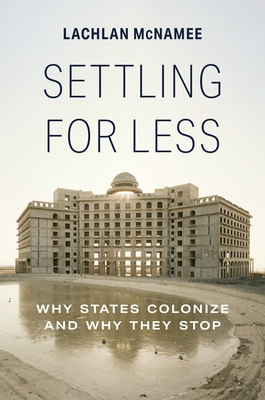Settling for Less: Why States Colonize and Why They Stop

Settling for Less: Why States Colonize and Why They Stop
Why countries colonize the lands of indigenous people
Over the past few centuries, vast areas of the world have been violently colonized by settlers. But why did states like Australia and the United States stop settling frontier lands during the twentieth century? At the same time, why did states loudly committed to decolonization like Indonesia and China start settling the lands of such minorities as the West Papuans and Uyghurs? Settling for Less traces this bewildering historical reversal, explaining when and why indigenous peoples suffer displacement at the hands of settlers. Lachlan McNamee challenges the notion that settler colonialism can be explained by economics or racial ideologies. He tells a more complex story about state building and the conflicts of interest between indigenous peoples, states, and settlers. Drawing from a rich array of historical evidence, McNamee shows that states generally colonize frontier areas in response to security concerns. Elite schemes to populate contested frontiers with loyal settlers, however, often fail. As societies grow wealthier and cities increasingly become magnets for migration, states ultimately lose the power to settle frontier lands. Settling for Less uncovers the internal dynamics of settler colonialism and the diminishing power of colonizers in a rapidly urbanizing world. Contrasting successful and failed colonization projects in Australia, Indonesia, China, and beyond, this book demonstrates that economic development--by thwarting colonization--has proven a powerful force for indigenous self-determination.PRP: 244.80 Lei
Acesta este Prețul Recomandat de Producător. Prețul de vânzare al produsului este afișat mai jos.
220.32Lei
220.32Lei
244.80 LeiLivrare in 2-4 saptamani
Descrierea produsului
Why countries colonize the lands of indigenous people
Over the past few centuries, vast areas of the world have been violently colonized by settlers. But why did states like Australia and the United States stop settling frontier lands during the twentieth century? At the same time, why did states loudly committed to decolonization like Indonesia and China start settling the lands of such minorities as the West Papuans and Uyghurs? Settling for Less traces this bewildering historical reversal, explaining when and why indigenous peoples suffer displacement at the hands of settlers. Lachlan McNamee challenges the notion that settler colonialism can be explained by economics or racial ideologies. He tells a more complex story about state building and the conflicts of interest between indigenous peoples, states, and settlers. Drawing from a rich array of historical evidence, McNamee shows that states generally colonize frontier areas in response to security concerns. Elite schemes to populate contested frontiers with loyal settlers, however, often fail. As societies grow wealthier and cities increasingly become magnets for migration, states ultimately lose the power to settle frontier lands. Settling for Less uncovers the internal dynamics of settler colonialism and the diminishing power of colonizers in a rapidly urbanizing world. Contrasting successful and failed colonization projects in Australia, Indonesia, China, and beyond, this book demonstrates that economic development--by thwarting colonization--has proven a powerful force for indigenous self-determination.Detaliile produsului










